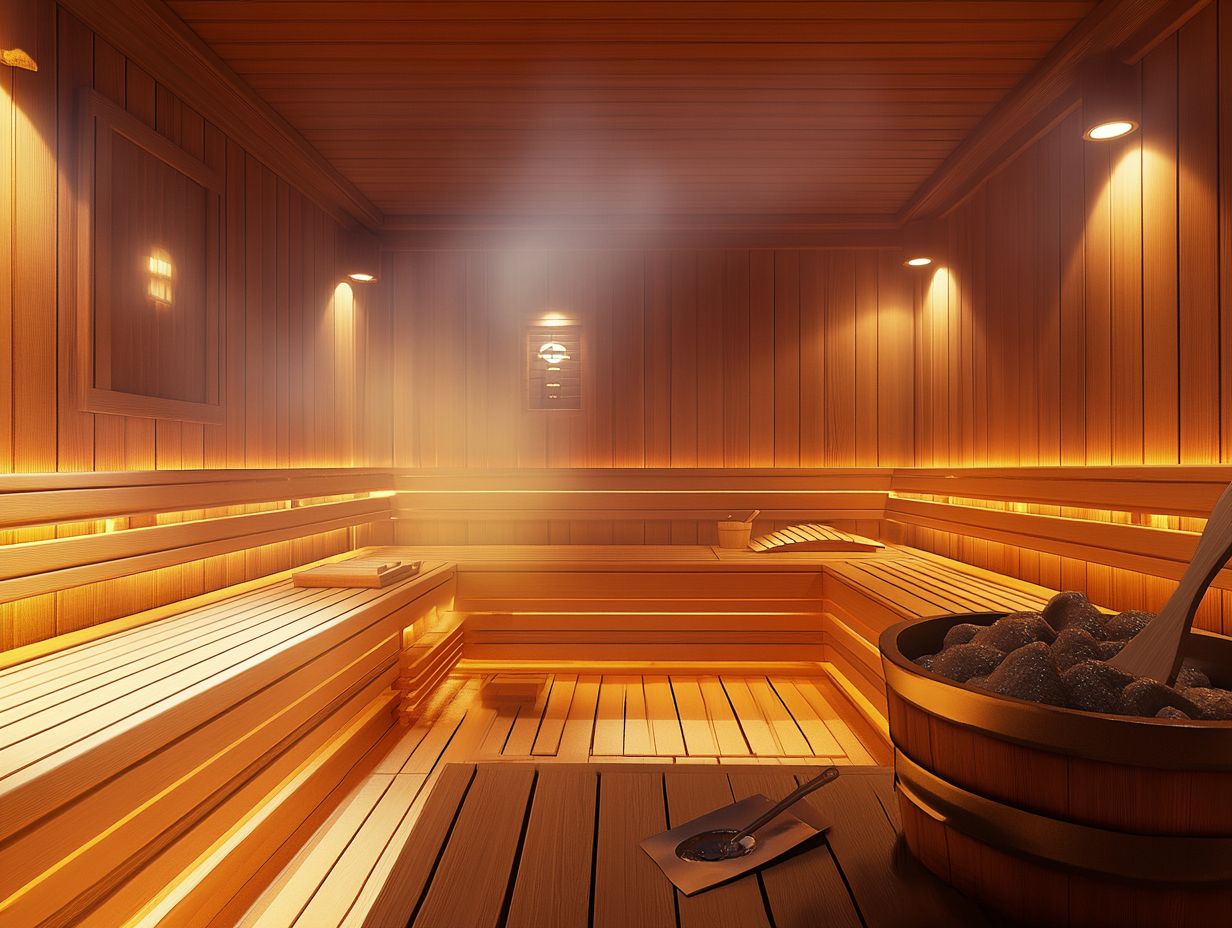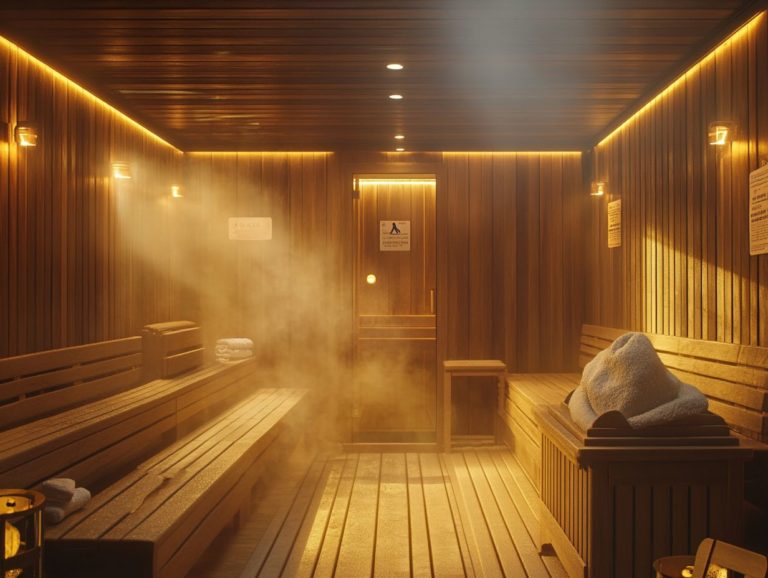Sauna Safety: The Role of Research
Saunas provide a serene escape and an array of potential health benefits. However, grasping their safety is essential.
This guide delves into the fundamentals of sauna safety, examining the inherent risks while presenting the latest research on both the advantages and potential pitfalls of sauna use. It addresses specific health considerations and offers practical tips for safe enjoyment. Additionally, it provides insights into the various types of saunas available today.
Whether you re a seasoned sauna enthusiast or a curious newcomer, this information will empower you to navigate the sauna experience with confidence and safety.
Contents
- Key Takeaways:
- The Basics of Sauna Safety
- Research on Sauna Use and Safety
- Stay Healthy: Key Sauna Safety Tips!
- Tips for Safe Sauna Use
- Alternative Sauna Options
- Frequently Asked Questions
- What is the role of research in ensuring sauna safety?
- How does research inform sauna safety guidelines?
- What are some common safety risks associated with saunas?
- How do researchers address these potential risks?
- Can sauna use be safe for everyone?
- What are some ongoing areas of research in sauna safety?
Key Takeaways:

- Regular sauna use has been linked to numerous health benefits. It’s important to understand and minimize the potential risks.
- Research on sauna safety has shown both positive and negative effects. This highlights the importance of informed and responsible use.
- Individuals with certain health conditions should take precautions when using a sauna. Consulting with a medical professional is recommended.
The Basics of Sauna Safety
Understanding the fundamentals of sauna safety is essential for anyone aiming to elevate their wellness journey through sauna bathing. Whether you prefer traditional Finnish saunas or modern infrared options, these environments offer unique opportunities for relaxation and a host of health benefits. These include enhanced cardiovascular health and stress relief.
However, it s vital to remain mindful of the risks associated with sauna use, particularly if you have specific health conditions or plan to indulge in prolonged sessions.
By adhering to established sauna safety guidelines and precautions, you can optimize the longevity of your sauna experience while minimizing potential health concerns.
Understanding Saunas and Their Risks
Understanding saunas and their associated risks is essential for anyone looking to enhance their wellness through heat therapy and sauna bathing.
You ll find a variety of sauna types that cater to your unique preferences and health considerations. Traditional and infrared saunas are the most notable options. Traditional saunas, heated by wood or electric stoves, create a humid environment that encourages sweating and relaxation. In contrast, infrared saunas use heaters that employ invisible light to warm your body directly while keeping the ambient temperature lower.
Both types offer a plethora of health benefits, such as improved cardiovascular health from increased circulation and muscle relaxation after workouts. However, it s crucial to exercise caution, especially if you have cardiovascular diseases or chronic health issues, as dehydration and overheating can present significant risks.
Research on Sauna Use and Safety
Dive into sauna use and safety to discover amazing insights into its health effects, particularly concerning cardiovascular health and neurocognitive diseases like Alzheimer s.
Studies on Sauna Benefits and Risks

Research on the benefits and risks of saunas reveals significant advantages for your cardiovascular health. Still, it s crucial to remain aware of potential risks, especially if you have certain health conditions.
A study from the University of Jyvaskyla in Finland found a noteworthy connection between regular sauna use and improved cardiovascular fitness. People who frequented saunas displayed lower blood pressure and better circulation.
A publication in the Journal of Human Hypertension noted sauna baths help alleviate chronic fatigue by encouraging relaxation and reducing stress.
However, if you have pulmonary conditions like asthma or chronic obstructive pulmonary disease (COPD), it’s essential to be cautious. The heat and humidity of saunas might worsen your symptoms. It s wise to consult healthcare professionals before adding sauna sessions to your wellness routine.
Stay Healthy: Key Sauna Safety Tips!
Health considerations for sauna use are crucial for individuals with certain health issues, as some groups may encounter heightened risks when engaging in sauna bathing.
Recognizing these factors ensures a safe and beneficial experience.
Precautions for Specific Health Conditions
Precautions for certain health issues are essential to ensure your safe enjoyment of the sauna, particularly if you have heart issues, chronic bronchitis, or are at risk of dehydration.
Approach sauna sessions with caution. Consulting your healthcare provider clarifies the appropriate steps to take before immersing yourself in the heat.
Stay hydrated before, during, and after your sauna experience. High temperatures can lead to considerable fluid loss. Limit your sessions to shorter durations ideally no more than 15 to 20 minutes at a time to avoid overheating.
Pay attention to your body and watch for any adverse symptoms, such as dizziness or excessive fatigue, to ensure your experience remains safe and enjoyable.
Tips for Safe Sauna Use
Utilizing effective tips for safe sauna use can significantly elevate your overall experience while minimizing potential health risks.
Incorporating these practices can make your sauna sessions an invaluable component of your wellness routine.
Best Practices for Sauna Safety

Best practices for sauna safety revolve around staying well-hydrated and monitoring your body’s responses. Create a comfortable relaxation environment that enhances the benefits of the benefits of sweating for health.
To elevate your sauna experience, drink ample water before entering to stave off dehydration. Limit your sessions to around 15-20 minutes while remaining attentive to how you feel.
Creating a calming atmosphere perhaps with soft music or dim lighting can significantly enhance your relaxation. Follow these fundamental practices to ensure a rewarding sauna experience that boosts your well-being and fosters tranquility.
Alternative Sauna Options
Alternative sauna options, like infrared saunas and traditional Finnish saunas, present unique benefits designed to elevate your health and relaxation routines.
Exploring Different Sauna Types
Exploring various types of saunas can enhance your sauna bathing experience, each offering unique health benefits tailored to your needs.
Imagine the soothing warmth of traditional wood-fired models, perfect for relaxation and social interaction, alongside the modern efficiency of infrared saunas that provide targeted muscle relief.
Consider how traditional saunas foster community as bathers engage in lively conversations amidst the steam. In contrast, infrared options attract those who prefer gentler heat, ideal for anyone sensitive to higher temperatures. Weighing these factors helps you find the perfect sauna choice that aligns beautifully with your wellness goals. To ensure a safe experience, be sure to explore sauna safety practices.
Frequently Asked Questions
What is the role of research in ensuring sauna safety?

Research plays a crucial role in understanding the potential risks and benefits of saunas and developing safety guidelines.
How does research inform sauna safety guidelines?
Through studies and experiments, researchers identify the optimal temperature, duration, and frequency of sauna use for maximum safety and health benefits.
Don t wait to consult your healthcare provider!
Start enjoying your sauna experience safely today!
What are some common safety risks associated with saunas?
Saunas can pose certain safety risks. Common concerns include excessive heat exposure, dehydration, and potential burns.
How do researchers address these potential risks?
Researchers conduct studies to identify safe heat exposure limits. They also develop safety measures like providing water and temperature controls.
Can sauna use be safe for everyone?
Sauna safety largely depends on your personal health. Always consult a healthcare professional before using a sauna, especially if you have a heart condition or are pregnant.
What are some ongoing areas of research in sauna safety?
Researchers are exploring exciting new technologies to enhance sauna safety. Innovations like infrared saunas and temperature monitoring devices are at the forefront of this research.






